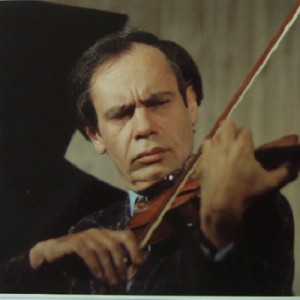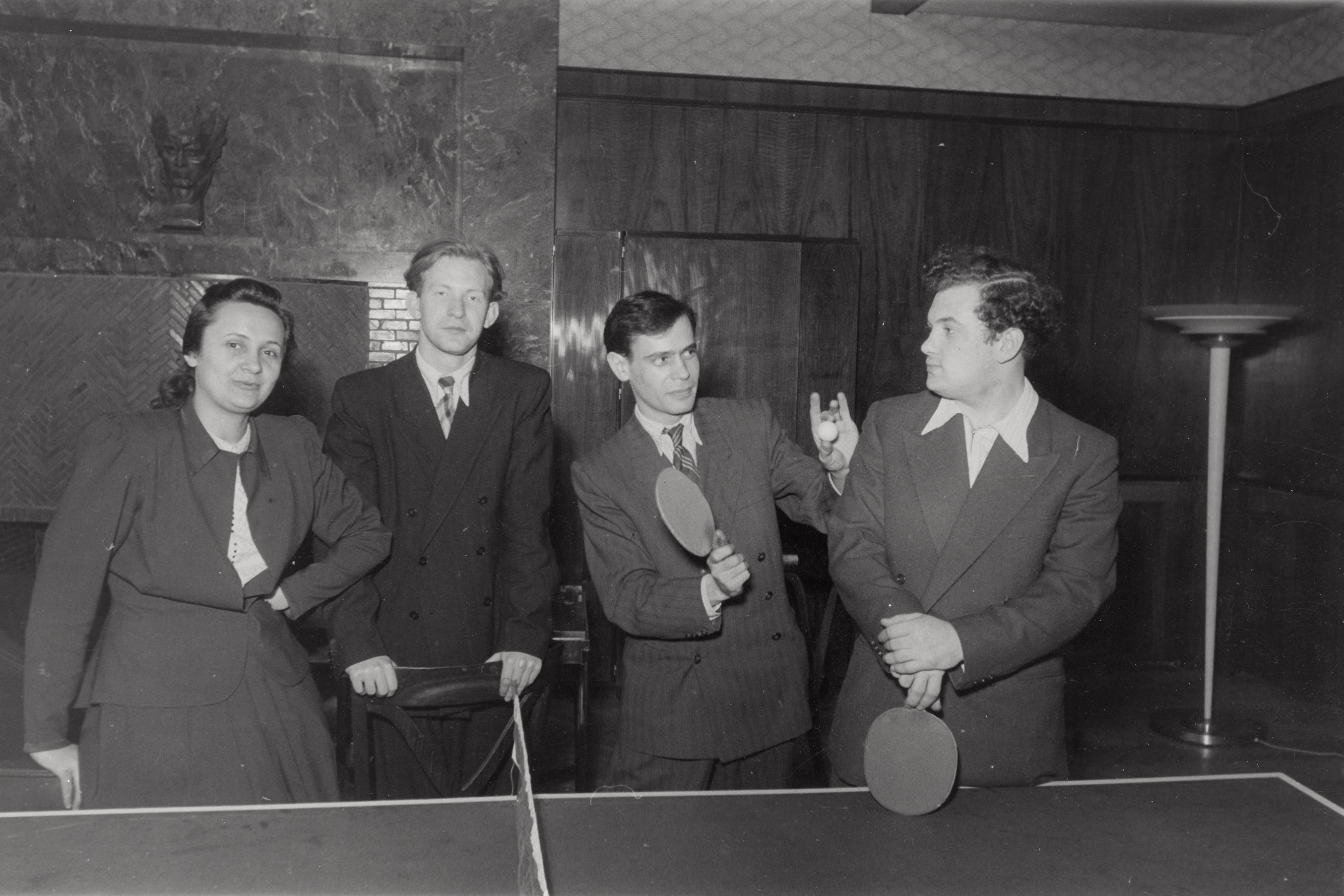Ear-witness #77. “All in memory of you..” our episodes about Russian music of the 20th century, dedicated to the wonder children of Avram Jampolski (18.10.1890-17.8.1956) in Moscow.
In 1951 the Queen Elizabeth Music Competition took place, the first one since World War II ended. It would be the first and until today the only time that Dutch violin players would win a prize at this world famous music contest. Kees Koper won the 12th prize and Theo Olof even won the 4th prize in the middle of all the Eastern-European contesters. Against the advice of his teacher Oskar Back, who happened to be in the jury and who was born in Hungarian Habsburg, Olof choose to play for his free choice piece the new and unknown Second Violin Concert of Béla Bartók. You will hear another performance of Olof in that same year, recorded by the KRO, together with the Residence Orchestra led by Antal Dorati in the Kurhaus in Scheveningen.
In the Soviet Union a union-wide competition had already decided who would represent the Soviets: Michail Vajman from Leningrad and Leonid Kogan, pupil and right hand of pedagogue Avram Jampolski from Moscow. The problem was that both contestants were Jewish and at that moment the Soviet Union was going through a new wave of anti-Semitism, boosted by the Kremlin. Kogans pupil Valentin Shuk can remember that Kogan told him that, when the moment of departure came, he received the message that he could not go. The day after he was allowed to go, the day after that he was not.. In the end the dilemma was submitted to Stalin himself, who was only interested in one thing: the first prize. Kogan and Vajman left for Brussels and with supremacy they won the first and second prize.
Michail Vajman was born in Novi Boeg in Ukraine in December 1926 and at the age of 7 he took his first violin lessons in Odessa with Pjotr Stoljarski. After evacuation to Tasjkent he ended up with Joeli Ejdlin of the Leningrad Conservatory. In 1944 he went with him to Leningrad, where he lived and worked as a musician and teacher until his sudden death in 1977. His collaboration with contemporary composers becomes apparent when you hear his performance of the Concerto-Poeem of Orest Jevláchov, which he plays with the Leningrad Academic Philharmonic Orchestra led by Arvil Jansons.
Avram Iljitsj Jampolski (photo) rarely left his
house. Valentin Zhuk can only remember two trips that his teacher made. He once went to Brussels to be a member of the jury at the Ysave contest, where David Ostriach won the first prize with persuasion. The second trip Zhuk remembers is the evacuation to Penza in 1941. He only came to the conservatory when his presence was absolutely required at the exams. His study at home on the other hand was a vivid environment, always filled with assistants, mentors, students and their parents and colleagues visiting. At twelve o’clock sharp his wife would enter the room to announce that classes would begin and at that time his assistant Leonid Kogan would then snoop into the room, never without his violin. One look of Kogan could make or break a student’s day. Jampolski would sit cooperative and willingly in his armchair but in all his subtlety he always knew how to put pressure on his students in such a way that they were about to cry. If it was not good enough he would simply say “No” and it was up to the pupil himself to find out what that meant. In the occasion that he would say “Yes!” then that obviously made the day of the student. Jampolski left the technique to his assistants Joeri Jankelevitsj and Leonid Kogan, which made both of them develop into qualified pedagogues. Jampolski respected each of his students, which made it possible for them to develop into very diversified musicians, as you will hear in the performances.
Vladimir Grigorjev remembers that when he spoke with Sjostakovitsj about his documentary on Kogan (photo on the left), the composer confided to him that he had warm memories of the performance of Kogan’s first violin concert, dedicated to David Ostriach. “Kogan played it even more startling than Ostriach, with much more drama,” according to Sjostakovitsj. “Kogan managed to discover new approaches in the work. If I am given the strength and time, I want to write a Third Violin Concert and I will think about him as a soloist.” In Earwitness 74 you could hear this first violin concert by David Ostriach. Take the time today to listen to the performance of the undisputed first prize winner of Brussels 1951, Leonid Kogan, together with the Moscow Philharmonic Orchestra led by Kirill Kondrasjin, in a recording of 1959.
The winners of the fifth and the seventh prize in Brussels were also Jampolski’s students: Olga Kavérzneva (left on the picture) and Aleksej Goróchov (right next to Olga, and beside him Kogan and Vajman). And in the international contests which came after Brussels the top prizes were also won by students of Jampolski. At the international contest in Prague, in 1947, Leonid Kogan already had to share his first prize with fellow students Joelian Sitkovetski en Igor Bezrodny. Jampolski once said about Sitkovetski, that where other violin players never had enough practice time in a day, the talented Sitkovetski would only need an hour. In 1950 Sitkovetski married Bella Davidovich, the 1949 shared first prize winner of the Chopin contest in Warsaw. Their son Dmitri, born in 1954, turned out to become a famous conductor and violin player. Bezrodny was the first prize winner in Leipzig in 1950 where he outran Vajman en Goróchov and in 1955 Sitkovetski won the gold medal for the second prize in Brussels after which he also came to Amsterdam. Members of the jury Yehudi Menuhin and David Oistrach believed that Sitkovetski should have won the first prize. In 1967 it was Vajman’s student Filip Hirschhorn who won the first prize in Brussels and Gideon Kremer won the third prize. In the Netherlands we also know Hirschhorn as the teacher of Liza Ferschtman and Janine Jansen.
Today we end Earwitness with Joelian Sitkovetski who died in 1958 of lung cancer at the age of 32. He played the violin concert of Sergej Ljapoenóv together with the USSR State Symphony Orchestra led by Sergej Gortsjakov.
1. Pjotr Iljitsj Tsjajkovski (7.5.1840 – 6.11.1893).
Méditation of Souvenir d’un lieu cher, opus 42-1 (1878).
Leonid Kogan (Jekaterinoslav, Ukraine, 14.11.1924 – Mytisjtsji (Moscow), 17.12.1982), violin, USSR State Symphony Orchestra led by Kirill Kondrasjin.
Brilliant Classics 93030/4.
2. Béla Bartók (25.3.1881 – 26.9.1945).
Violin concert nr. 2 BB 117 (1937-1938), dedicated to Zoltán Székely: 1) Allegro non troppo, 2) Andante tranquillo, 3) Allegro molto.
Theo Olof, violin (Bonn 5.5.1924 – Amstelveen 9.10.2012), Residence Orchestra led by Antal Dorati.
KRO-recordings Kurhaus Scheveningen 1951.
Remastering: Okke Dijkhuizen, DOCU Music Production.
3. Orest Aleksandrovitsj Jevlachov (1912 – 1973).
Concerto-poeem for violin and orchestra, opus 39.
Michail Izrailevitsj Vajman (3.12.1926 – 28.11.1977), violin, Leningrads Academic Philharmonic Orchestra led by Arvil Jansons.
MEL CD 10 00952.
4. Dmitri Dmitrijevitsj Sjostakovitsj (1906-1975).
Violin concert nr. 1 in a, opus 77 (1948): 1) Nocturne, 2) Scherzo, 3) Passacaglia – Cadenza, 4) Burlesca (recording 24.4.1959).
Leonid Borisovitsj Kogan (14.11.1924 – 17.12.1982), Moscow Philharmonic Orchestra led by Kirill Kondrasjin.
Brilliant Classics 93030/2.
5. Sergej Michajlovitsj Ljapoenov (1859-1924).
Violin concert in d, opus 61 (1915; revised 1921): 1) Allegro appassionato, 2) Adagio, 3) Tempo I (recording 1948).
Joelian Grigorjevitsj Sitkovetski (Kiev 7.11.1925 – Moscow 23.2.1958), USSR State Symphony Orchestra led by Sergej Gortsjakov.
SYD Records 003.
Acknowledgements to Valentin Zhuk.








